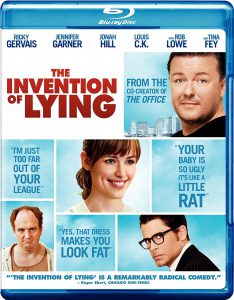Sort of like “Idiocracy” or that Mel Gibson picture where he could read women’s minds, “The Invention of Lying” (now on DVD) posits an alternate reality and then has fun exploring it with a series of “What would you do here?” situations. This Ricky Gervais vehicle (the likable, lumpy Brit stars and also co-wrote and co-directed) asks “What if there was a world where no one had ever thought of lying?”
Other than the lack of lying — there isn’t even a word for “truth” or “lying” — and some pretty horrible entertainment options (no lying means no creativity, but the brutally honest advertisements for Coke and Pepsi are hilarious), the world is exactly the same as ours. There are winners and losers, and you don’t wanna get caught on the wrong side of that line. But in this film’s world, everyone will tell you if you’re a loser: Love interest Anna (Jennifer Garner) and other characters often tell Mark (Gervais) that he’s pug-nosed and fat.
This film’s Philip K. Dickian world appeals to me, as someone who has trouble lying (I also have trouble not telling the truth sometimes — and it gets me in trouble). How can a world filled with insults and crass admissions (Anna tells Mark she’s going upstairs to pleasure herself before their bound-to-be-disappointing date) be appealing? Because there’s nothing to decipher; you know exactly what everyone’s thinking.
And if you’re a good person, you’ll eventually be recognized as such. Anna insults Mark’s looks (he takes it in that classic Gervais under-his-breath “Your opinion” manner), but she also says he’s smart and fun to be with. Mark’s co-workers at a movie-scripting office aren’t so kind, but then, that’s a reflection on them (Rob Lowe, among a cast filled with great cameos, plays The Jerk to perfection).
Mark’s goodness shines through once he acquires the ability to lie via an instant random mutation in his brain (or a gift from the Man in the Sky, if you prefer). He starts off by solving his own problems, such as the $800 he owes for rent. His bank account has $300 in it, but when he asks for $800, the teller knows the system must’ve screwed up; she has no concept of lying. Next, though, Mark gives a homeless person money, talks his neighbor (Jonah Hill) out of suicide, and tells his dying mother that she’s going to a better place.
The latter fib gets him worldwide attention and soon he is a Christ figure. I love the image — framed just perfectly to show how bizarre it is — of the tiny, tubby Mark standing on the steps of a grand building (the equivalent of a church — no lying, so no religion in this film’s world) where he delivers a 10 commandments of sorts and fields endless questions from the crowd.
Indeed, Mark is a Christ figure. He’s a human who is suddenly given a superpower that no one else has, and that instantly, unequivocally makes him the most powerful person on Earth. He uses his power for good, but you see the potential for corruption by his followers just by the open-endedness of his proclamations. It’s a great metaphor for how Christianity might have started. Jesus might’ve been a good, well-meaning guy who didn’t foresee the corporatization of religion centuries down the road.

So is this film’s world better once lying enters into the picture? Well, without a doubt the entertainment will improve. But the personal relationships suddenly get a lot more confusing — and that’s not a good thing for me (but others might find it more appealing).
Be sure to rent this movie for a lot of laughs and food for thought. “The Invention of Lying” is a great film — I’ll place it at No. 2 on my 2009 list — and that’s no lie.

